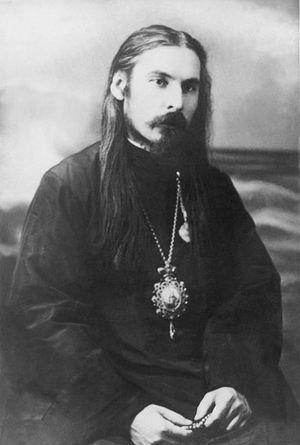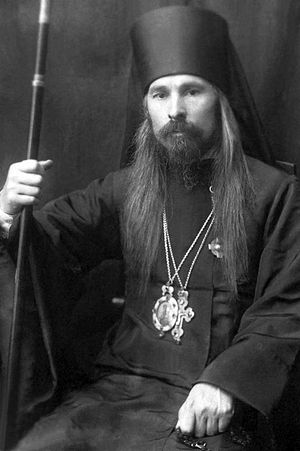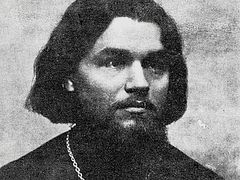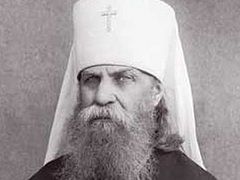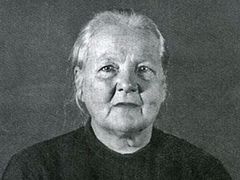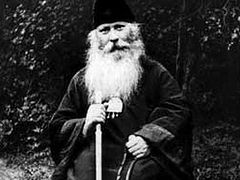“When I become a bishop”
When Anthony Gagalyuk was five1, a tragedy happened with his father. One winter as he was making his rounds (he was a forest ranger) he saw four men cutting trees in a state forest without permission. As an honest man he would not let them go unpunished. But the men attacked him with an axe and that night set the forest ranger’s hut on fire.
Many years later his mother Catherine recalled how her five-year-old son tried to comfort her after his father’s death (the latter had died of wounds soon after the attack). Sitting on his grieving mother’s lap, the boy said, “Stop crying, mommy! When I become a bishop I will take you to live with me!”
Sometimes the Creator partly reveals events of the future to us, though in the everyday hustle and bustle we often forget these revelations. It is not until prophecies come true that we remember hearing about these things before.
Anthony indeed was destined to become a bishop. As for his mother, she afterwards became a nun and lived near her son for many years.
When young Anthony was a seminary student, he fell seriously ill and an elder appeared to him (either in a dream or in a vision) and said, “Promise to serve the Church and you will recover!” When Anthony looked at an icon of St. Onuphrius the Great not long after this he immediately recognized the elder who had appeared to him.
The young man recovered, as was foretold him. But after his second year at the theological academy he ended up at the hospital again. The saint again appeared to him and said even more sternly, “You promised to serve the Church!” Anthony woke up, and asked to be allowed to receive the monastic tonsure.
Bishop Onuphrius (in Russian: Onufry), who was given this monastic name in honor of St. Onuphrius the Great, served the Church his entire life. He remained faithful to the path predestined by the Almighty to the end, enduring the severe trials of Church schism,2 numerous exiles and prisons, humiliation, beating, slander and betrayals. “The Lord is always just,” he wrote in one of his letters. “What is the reason for this unspeakable suffering of soul? The reason is the unbelief, blasphemy and sacrilege of the top leadership, the apostasy of many former bishops and priests who are now renovationists and schismatics, the indifference towards Church shrines, and the lack of faith in many people who call themselves Orthodox!”
“So much was endured over a short span of time”
The Revolution, the civil war, the anti-Church persecutions were the means by which God tested people’s faith. Some Orthodox clergy became Renovationists. They were freer to pursue Church activities through their “collaboration with the state”.
Several days after the consecration of Archimandrite Onuphrius as bishop3 and his first hierarchal service authorized representative of the “Renovationist Supreme Church Administration” Trofim Mikhailov came to him. The bishop said resolutely that he refused to recognize any “Supreme Church Administration”. On the following day the hierarch was arrested. Two years later, recalling his time spent in prisons, Bishop Onuphrius wrote, “So much has been endured over a short span of time. I have been a bishop for only two years, but six months of them have been spent in jails… I remembered my voluntary and involuntary sins. And the Lord made me rejoice by giving me to drink of the cup of suffering for my sins.”
The years of imprisonment did not break but toughened St. Onuphrius. Over the years of his ministry he carried on a decisive struggle against adherents of the “Living Church”, and he was arrested many times for this activity. “My dear friend, you ask me with apprehension what will become of our Orthodox Church in some thirty years,” he wrote in one of his letters in those times. “The blood of the faithful may be shed. Let it become the seed of the Church, as it was in the first centuries of Christianity, and may this seed grow into a strong Christian community. Persecutions and bloodshed are not new for the Church of Christ. We went through all of this in the past. And every time it led not to the destruction of the Orthodox Church, but to its glorification and spread.”
On October 12, 1926, the hierarch was arrested again. In November at the special meeting of the Board of the Joint State Political Directorate (OGPU) he was sentenced to three years of exile in the Ural Mountain village of Kudymkar for his resistance to the Church schisms.
There were few religious people in that area, and the bishop after his huge flock in Kharkov became a true missionary in the environment of the triumph of militant atheism. “Our preaching is weak here,” he wrote in one of his letters while in exile.
Over that period the bishop wrote very much and tried to preach Christ as much as possible. Of course, this activity could not be concealed from the authorities. On the bishop’s name day the authorities searched the apartment where he lived. Absolutely everybody said that a local priest was to blame for that arrest, for he had informed on St. Onuphrius. “What has happened to Christians, even a priest?” the bishop expressed regret in one of his letters of that time.
“Once you lose God you lose love along with Him”
In October 1928, Bishop Onuphrius was arrested and sent to Tobolsk. An unpleasant incident met him on the way. Somebody pretending to be a beggar came up to the hierarch, hit him on the left arm and ran away. “My enemies wanted to kill me, but the Lord saved me,” he recalled afterwards.
The hierarch then was transferred from Tobolsk to Surgut. There were icons in all the huts where the escort made stops en route, with the exception of the village of Samarovo, “The family in whose hut we stopped for the night did not have a single icon,” the bishop recollected. “The family was obviously not religious. I watched them. The father and the elder son (an active atheist) made an uncertain impression. This thirteen-year-old Andryusha [a diminutive form of the Russian name Andrei] turned out to be a mean and spoiled boy; he followed an exiled Jew from my group furtively when the latter secretly walked outside the gate, where his friends living in the same village were waiting for him. The boy eavesdropped on the Jew and then informed the escort about it. The teenager did not take pity on the poor convict. The mother was extremely rude and even slovenly. She scolded me, though I was her guest, an arrestee with a grievous appearance. She charged me two rubles for a small piece of bread and a glass of tea with milk, though in reality it cost thirty kopecks [100 kopecks make one ruble]. It is true that once you lose God you lose love, compassion, meekness along with Him, and become a cruel, rude, avaricious animal… May the Lord bring these miserable people back to their senses!”
Bishop Onuphrius insisted, “The main duty of a bishop is to preach the Word of God. Almost all of us proclaim the Kingdom of God on earth in word. But only some of us take on the podvig [spiritual labor, feat in Russian] of spiritual writing upon ourselves… Today writing spiritual works is far more important for bishops… Now that many questions about the current life have arisen, it is our obligation to answer them, being guided by the Holy Bible, the Church canons, and the writings of the Holy Fathers, offering up our fervent prayers to the Lord and Comforter, Who enlightened the illiterate apostles…” And he wrote much. “If we are silent, then who will speak in our place? The Almighty Himself has sent us out to proclaim His Kingdom, and, truly, woe unto me, if I preach not the Gospel (cf. 1 Cor. 9:16)!”
“Be faithful unto death”
The Tobolsk exile ended. On October 14, 1929, the Board of the Joint State Political Directorate passed a judgment at a special meeting: “After serving his term Anthony Maksimovich Gagalyuk shall be deprived of his rights of residence in Moscow, Leningrad, Rostov-on-the-Don, and the Ukrainian Soviet Socialist Republic and shall be registered at a fixed address for a period of three years.” The hieromartyr chose Stary Oskol.
In 1933, it was the tenth anniversary of His Eminence Onuphrius’s consecration as bishop, and nearly half of these ten years were spent in prisons and exiles.
“Over these years I bore many temptations, fears, apprehensions and dangers. But the Lord delivered me from all these tribulations. The sorrows of exiles and prisons are insignificant compared with those of the Church… How did I manage to avoid all these schisms, inexperienced and timid as I am?… It was only by the mercy of God!” the hieromartyr wrote, summing the period of his ministry up.
In March 1933, the bishop was taken to custody again. In June, the authorized representative of the Joint State and Political Directorate Krivtsov rendered a judgment on Bishop Onuphrius: “During his time spent in Stary Oskol the bishop gathered an anti-Soviet ‘monastic element’ around himself and strove to masquerade as a martyr for the Orthodox faith, persecuted by the Soviet Government, before the most fanatical peasants from among believers.” But no evidence against the bishop was found, so they had to release him.
St. Onuphrius moved to Kursk. Eyewitness reminiscences of the hieromartyr’s life in those years have survived. One winter evening a sick, aged priest who was faint with hunger and had just been released from prison came to St. Onuphrius. He was in a patched, torn summer cassock and was shivering with cold. The archbishop immediately asked for a bath to be heated for him and clean clothes given him. After that he invited him to his apartment, gave him food and offered him his bed for the night, while he himself lay on a couch. In the morning, before setting off for the village, the priest put on his threadbare cassock (which had been washed and dried over the night) and was about to say good-bye to the hierarch. However, the archbishop smiled and said that he could not let him go out in freezing cold in the old clothes and asked his housekeepers to bring him some warm coat, but they did not find anything. Then the hieromartyr remembered that shortly before some believers had given him a new warm cassock lined with squirrel fur. When it was brought to him, St. Onuphrius himself put the cassock on the old priest and blessed him before his departure. The priest was very happy and left their house with tears in his eyes. Then the hierarch’s mother, Nun Natalia, said to him that he did not have any other warm cassock and he really needed one. But the archbishop laughed and replied, “The all merciful Lord will send me another one.”
The hierarch’s letters on spiritual themes are a living word of preaching. “Recently I intentionally told a lie in my conversation, defending my friend from danger,” the reflections of St. Onuphrius read. “And what happened next? At the same moment I felt that my heart was heavy. What was it? It was my sin by which I made a ‘black spot’ on my soul… So I was tormented, worried, annoyed, and agitated for a long time and lost my inner peace. And it was not until I went to a priest, repented of my sin, and promised not to tell lies any more that I finally got better. Truly it had been the power of sin in action.” Let us recall the following words of the Holy Apostle James, For whosoever shall keep the whole law, and yet offend in one point, he is guilty of all (Jas. 2:10).
Vladyka Onuphrius’ last exile was to Russia’s Far East. It was in March 1936. “I thank the Creator for everything!” he wrote to his mother at that time. In July 1937, the Soviet Government passed the Resolution R 51/94 “On Anti-Soviet Elements”, and, according to the Order of the NKVD (the People’s Commissariat for Internal Affairs) of the USSR No. 00447 the confessors who languished in prisons and exile were to be executed by firing squad. Thus new proceedings against Archbishop Onuphrius began.
The holy hierarch was executed by firing squad on June 1, 1938. Bishop Anthony (Pankeyev) of Belgorod along with fifteen representatives of the clergy were martyred together with him.
Ten years before his martyrdom, in exile, Bishop Onuphrius wrote, “Fear none of those things which thou shalt suffer: behold, the devil shall cast some of you into prison, that ye may be tried; and ye shall have tribulation ten days: be thou faithful unto death, and I will give thee a crown of life (Rev. 2:10). God wants to test our faith and faithfulness by means of these persecutions. And those who will stand firm in faith will be rewarded with the crowns of life… These persecutions are the cross given us by God Himself.”

